Going Ape: Peter Jackson's "King Kong"
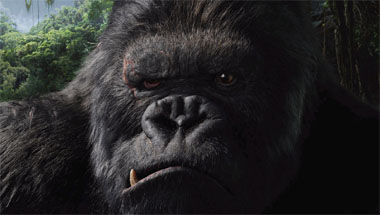
Beware the film (or any enterprise) that features the maker's name prominently above the title. Think M. Night Shyamalan's The Village. Think Wes Craven's Nightmare on Elm Street Part 4. Think Martha Stewart's anything. Once you've made it, once you're box office boffo and the very utterance of your name sends movie geeks ashiver, then comes the follow-up movie, with its attendant indulgences, the arrogance, the too much of everything. Before you know it, you're raving randomly about some B-grade horror movie (i.e., Quentin Tarantino and Wolf Creek). Or worse yet, you surrender to the lure of standard Hollywood product (i.e., the trailer for Spike Lee's latest offering, Inside Man, which reeks of normalcy). Forget about roads paved with good intentions -- these are expressways lathered with good old-fashioned hubris.
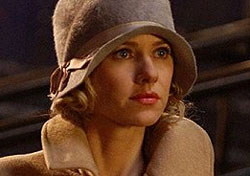 Peter Jackson avoids these roads -- just barely -- in his newest tale, titled, ahem, Peter Jackson's King Kong. In keeping with the extravagances allowed to a hit filmmaker, Jackson goes for a "more is more" policy; where the original Kong (1933) clocked in at a fast-paced hour and a half, this one doubles the length, but instead of extra flab, this one is all muscle, like a steroid-infused bodybuilder. If ever there were a subject ripe for hubris, this is it, but if you're going to go over the top, why not go right to the apex of the Empire State Building?
Peter Jackson avoids these roads -- just barely -- in his newest tale, titled, ahem, Peter Jackson's King Kong. In keeping with the extravagances allowed to a hit filmmaker, Jackson goes for a "more is more" policy; where the original Kong (1933) clocked in at a fast-paced hour and a half, this one doubles the length, but instead of extra flab, this one is all muscle, like a steroid-infused bodybuilder. If ever there were a subject ripe for hubris, this is it, but if you're going to go over the top, why not go right to the apex of the Empire State Building?To be fair, the first Kong was a seminal event in Jackson's childhood, and we can't begrudge him the right to pay tribute to the old classic with modern flair, and even if the film itself is pure geek-out, the outpouring of one man's kid-like fantasies, he has the good grace to bring us in on the fun most of the way.
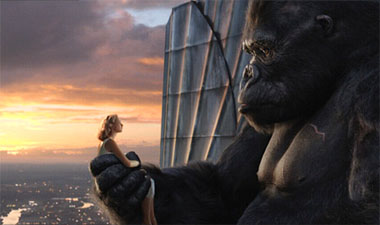
The very idea of Kong, as established in the original, is a collision of Boys' Own Adventure (with its prehistoric creatures, uncharted isles, and hostile natives), with not-so-subtle riffs on white male anxiety over miscegination and black dominance (the latter is certainly debatable -- for spirited arguments on both sides of the coin, see here). Jackson, rather than updating these motifs as John Guillerman did in his version of Kong (1976), charges full-bore into them, preserving the primal appeal of the source material. We are back in 1933: New York hustles and bustles, the natives are fearsomely native (and just as ready to pilfer white women), Kong takes on the biggest, baddest dinosaurs available, and Naomi Watts (as Ann Darrow) shrieks with the best of them.
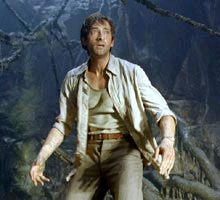 But Jackson is no xerox machine, cranking out carbons of the past. As a filmmaker, he has established his own unique take on the world as a charnel house where the dessicated and the creepy-crawly are mere inches away, where old-fashioned emotion and melodrama are stretched into hyper-operatic realms, where every moment of repose is overwhelmed by assaults of digitally-created horrors and equally queasy camera zig-zags. The central section of Kong, set amongst the unrelenting dangers of Skull Island, is the embodiment of this style, and no surprise, it's the best part of the movie. Jackson may steal from Spielberg's Jurassic Park and Indiana Jones pictures, but his pulverizing, no-rest-for-the-weary approach is all his own. Kong doesn't get to battle just one dino, but three at once, trading blows and plummeting down chasms in a ceaseless flurry of movement. Heroic Jack Driscoll (Adrien Brody) doesn't fight off a single giant spider, he combats a whole hoard of them. Every moment of suspense or grandiose special effect is lingered over, wrung like a wet towel. This would be deadly if your typical hack was at the helm, but Jackson has learned a thing or two from his Lord of the Rings cycle about pace and movement. For such a heavy-handed director, his work is fleet and free of smugness. He may be pleased with his creations, but he never assumes the audience is, and with showman instincts, he keeps his three-ring circus moving along, dashing from one setpiece to the next. It's popcorn, but like other great mainstream entertainers, Jackson knows how to supply the pop.
But Jackson is no xerox machine, cranking out carbons of the past. As a filmmaker, he has established his own unique take on the world as a charnel house where the dessicated and the creepy-crawly are mere inches away, where old-fashioned emotion and melodrama are stretched into hyper-operatic realms, where every moment of repose is overwhelmed by assaults of digitally-created horrors and equally queasy camera zig-zags. The central section of Kong, set amongst the unrelenting dangers of Skull Island, is the embodiment of this style, and no surprise, it's the best part of the movie. Jackson may steal from Spielberg's Jurassic Park and Indiana Jones pictures, but his pulverizing, no-rest-for-the-weary approach is all his own. Kong doesn't get to battle just one dino, but three at once, trading blows and plummeting down chasms in a ceaseless flurry of movement. Heroic Jack Driscoll (Adrien Brody) doesn't fight off a single giant spider, he combats a whole hoard of them. Every moment of suspense or grandiose special effect is lingered over, wrung like a wet towel. This would be deadly if your typical hack was at the helm, but Jackson has learned a thing or two from his Lord of the Rings cycle about pace and movement. For such a heavy-handed director, his work is fleet and free of smugness. He may be pleased with his creations, but he never assumes the audience is, and with showman instincts, he keeps his three-ring circus moving along, dashing from one setpiece to the next. It's popcorn, but like other great mainstream entertainers, Jackson knows how to supply the pop.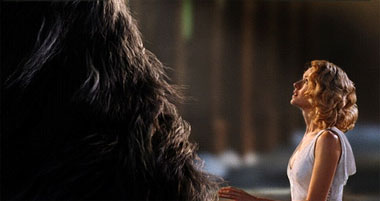
Where it goes wrong is when Ann Darrow and the King get together. Watts is a fine actress (I still say her turn in Mulholland Drive will stand as one of the best acting jobs of the decade), and she has a grand time conveying her character's pluck and heart, even when the script makes her the butt of the joke. She's at her best in her casual interplay with the beast, as when she hoofs it vaudeville-style to amuse him. But things get sticky once fear and respect burgeon into love, and Jackson strands her with loving close-ups of her tear-stained cheeks, bathetic looks exchanged between girlfriend and apefriend rendered in slower-than-slow motion. We're meant to get caught up in the sweep of doomed love, but Jackson is nowhere near as dexterous with human drama as he is with sound and fury, and his script (co-penned with Fran Walsh and Philippa Boyens of Rings fame) offers little beyond some clunky foreshadowing ("Nothing good ever lasts"). We can buy Watts' admiration and affection for the big man, but is it possible to buy the prospect of true love? Not with the hokum of a swooning woman and a guy in an ape costume (even if the costume is exquisitely animated, and acted by Andy Serkis). By the time the Empire State finale thunders in, with weepy-eyed farewells and death scenes that reach a crescendo of Shakespearian simian pathos, you may very well wonder: Is this really that tragic? I just want to see him bust up more airplanes. So beware, Mr. Jackson -- you escaped the curse this time, but you best get a handle on this grand emotion thing.


2 Comments:
Your remarkable and very funny review takes Peter Jackson's King Kong to task for precisely the things that most other reviewers find so goddamn wonderful: that is, the cloying romance between the apparently cockless, slightly snaggle-grinned beast and the blonde babe. I will love you forever for that.
I had other problems with this film...a creeping sadness became full-blown melancholia by the time I saw the seemingly improbable words "Amos 'n' Andy" flash on that famous Times Square sign (several times, no less) in the final take-the-ape-out scenes of Jackson's Kong. Of course, "Amos 'n' Andy" were one of Hollywood's racial abberations: a blackface comedy duo that trafficked in the degradation of whites; and like the black performers who were themselves forced to don blackface (actually and figuratively like Hattie McDaniel) to make a living in Tinsel Town, the participation of blacks in the racial stereotyping does not absolve the system of its deepset bigotry.
I wasn't just saddened when the only black man--the skipper of the Venture steam ship--sacrificed himself to save his white boyfriend (in the classic Huck Finn moment so often played out in fantasy and horror flicks)...I was also saddened that Jackson's King Kong did not escape the same racialized (or even near-racist) codes that all versions of King Kongs unspooled.
Of course, these films are anthropological-templates for commercial cinema's love/hate relationship with nonwhiteness. The blonde and the beast relationship was as key to Birth of a Nation as it is to the "native people's" parable in Kong. Previous versions actually showed black actors with tighly curled hair as natives on Skull island. Jackson's version darkened their skin but, before God, most of those natives looked like white Australians (or New Zealanders) in blackface with endlessly, oily stringy hair.
The race-codes are even furthered by the stupid and workmanlike reference to stereotypically servile and debased Asian identity (another classic Hollywood pathology). Then Jackson's film really went there: The whiteboy deckhand is reading Joseph Conrad's novel of racist imperialism in Central Africa, Heart of Darkness (and I'm not saying Conrad was a racist novelist; just that in a novel that critiques imperialism, blackness itself is still pathologized and, most importantly, no black character is as fully drawn and developed as the white ones into a full-fledged human presence and these problems make the novel reenact that which it critiques to a certain degree).
For once, I wanted a fantasy film remake to drop all the race-madness. For the love of God: it's speculative fiction. You don't have to have all those codes, stereotypes, references, and pathologies in this day and age (and, of course, we never had to have them in our cinema).
I feel sad that my sentiments are practically non-issues for most viewers. We take this madness for granted: par for the course.
Remakes have the opportunity to improve on the "originals." What would you say if I made the radical claim that Kong's heavy-handed racial codes and stereotyping are in some ways worse than the original (if being stabbed in the back with veiled references is worse than a full-frontal hit)?
Forgive my long-windedness, Ho.
I agree with what you say, Jonathan ... I missed the Amos 'n' Andy marquee, sharp eyes there. What was disappointing for me is there was a certain social consciousness at the outset -- the shots of caged animals in the New York Zoo, followed by a quick cut to Depression-era bums stuck in their shantytowns. The sociological parallels aren't explored anywhere else, sadly.
I suspect a longer, director's-cut Kong might address some of these issues (hopefully in an interesting way), but this film is Jackson's valentine to the "classic" cinema that inspired him, which includes all the embalmed tropes and stereotypes you mention -- which goes to show how insidious these tropes and stereotypes are. I honestly don't think Jackson set out to perpetuate anything, but in his slavish attention to "period" details (i.e., "old Hollywood" details, including a twinkly-bright New York City that probably never existed), he ends up getting swallowed whole by all the pratfalls you mention. It's a bit disconcerting to think that recapturing one's childhood means rehashing images of savage black people and subservient Asians with buckteeth and accents. I probably feel a bit more sympathy for Jackson than you do -- in the end, he's just like the rest of us, taking delight in the lights and shadows on screen, buying into the dream without second thought. Maybe that's mainstream cinema in a nutshell. It's rare to find the popular filmmaker (David Cronenberg comes to mind, or even John Woo) who can implant these stories with the hint of subversion, or fresh subtext.
Post a Comment
<< Home